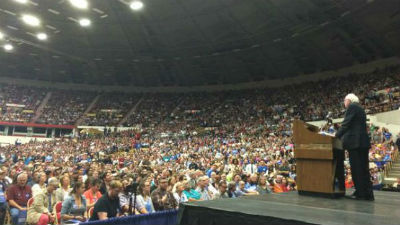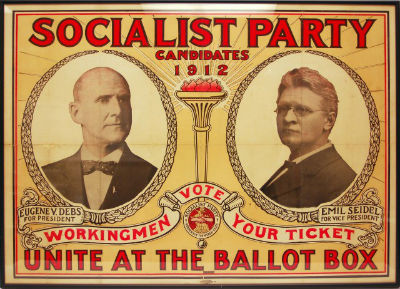The Bernie Sanders campaign for the Democratic presidential nomination is probably the most exciting development in US politics since the 1930s. And it’s not a coincidence that both the resurgent left of that decade and the Sanders phenomenon have followed the spectacular economic crashes of 1929 and 2008.
The Sanders campaign is a phenomenon. He’s not only rising rapidly in the polls, posing a clear threat to Hillary Clinton, but he’s raising millions of dollars in small donations and filling arenas with supporters – including in some surprising places, like Phoenix, Arizona.
A self-described democratic socialist and a former member of the Young Peoples Socialist League (YPSL), Sanders was influenced by an early visit to a kibbutz in Israel in the 1960s, and by the model of Scandinavian social democracy. He’s proposed a number of radical reforms that put him far to the left not only of any other mainstream presidential candidate this year, but to the left of anyone in living memory.
There’s not been a campaign like this since Norman Thomas led the Socialist Party to its second-best result ever in 1932, polling just under 900,000 votes. (The Communist Party back then polled only a fraction of the Socialist vote.)
But there’s a problem with Sanders’ call for a “political revolution” in America. It’s not going to happen without organisation. And a presidential election campaign is not an organisation.
In 2008 Hillary Clinton ran for president and built a huge base of supporters, coming close to defeating Obama for the Democratic nomination. She managed to sign up about 2.5 million supporters. Keeping in mind that Clinton has always had money and staff, and always intended to make another try for the presidency (as she’s now doing), the New York Times story last week about her campaign contained this stunning fact: of those 2.5 million names, only 100,000 turned out to be valid email addresses just eight years later.
Hillary Clinton managed to lose 96% of her supporters’ contact details in just eight years. And she’s struggling to raise money from individual small donors, which Sanders is doing exceptionally well.
That’s what happens when you run a presidential campaign every four or eight years. You can’t sustain the organisation, and you lose valuable contact details from people who clearly support you and your ideas.
Even worse than Clinton is the example of John Edwards, who ran an unashamedly social democratic campaign in 2008, far to the left of both Clinton and Obama. Of the hundreds of thousands of people who signed up to support his agenda for change, there is nothing left at all.
Bernie Sanders will understand all of this. On the wall of his office in the US Senate is a framed photo of the legendary American Socialist Eugene V. Debs. Debs, as Sanders knows, founded one organisation after another in his life, starting with railway workers, and continuing with the Industrial Workers of the World and the Socialist Party.
That Party for all its flaws managed to build a nationwide organisation with hundreds of elected officials, thousands of local branches, and hundreds of local and national publications. Though the Party had a “near death experience” in the 1920s, it was still around – if crippled and weak – in time for the Great Depression and its revival.
There is nothing like this today in the US. The last remaining survivors of Debs’ and Thomas’ party helped found the Democratic Socialists of America (DSA) more than 40 years ago. But DSA has not thrived, and never achieved its goal of creating a powerful democratic socialist presence in the country.
There needs to be such an organisation, whether it’s a socialist party, or a labour party, or even something like DSA, but with real clout. Without those things, electoral campaigns become meaningless expressions every few years of protest or hope – and not sustained movements for social change.
So what happens now? The most likely thing is that Sanders will wage a good fight, and then Hillary Clinton will capture the Democratic nomination. When that happens, Sanders himself and most of his supporters will support Clinton, because the alternative of someone like Donald Trump winning the presidency is truly terrifying.
But a second Clinton presidency will almost certainly disappoint most of those who voted for it, just as the first did, and some will grow disillusioned and withdraw from politics. This may be particularly true with young people for whom the Sanders campaign is their first taste of politics.
Sanders is calling for a “political revolution”, and for giving the “billionaire class” (as he calls it) a good kicking.
But revolutions take time, and even the lengthy presidential campaign in America is not long enough.
What America needs is a mass party of the left. This can be built inside the Democratic party or outside of it. But it cannot be replaced by a presidential campaign, no matter how charismatic the candidate or how compelling the message.
I doubt very much if anyone in the Sanders campaign is giving any thought to this at all. I doubt it. And that’s the problem with Bernie Sanders.
This article appears in Solidarity.


“I doubt very much if anyone in the Sanders campaign is giving any thought to this at all. I doubt it. ”
Can you give your reasoning for this?
There’s no evidence I’ve seen coming from the campaign, including in the run-up to the launch, that this will be anything different from, say, Howard Dean’s campaign in 2004 or John Edwards’ campaign in 2008. In other words, they’ve set their sites on winning votes, not on building a permanent organization that will survive 2016. But I’d be happy to hear otherwise.
I can assure you that folks in the campaign are thinking about this, though the expression of it will be different than what most ‘mass party of the left’ folks think.
That’s very good to hear. It would even better if we could hear some of that thinking from the campaign and the candidate. I hope you’re right.
Even though I hope that your conclusions (1. Bernie won’t win the nomination; 2. Bernie won’t continue building the movement) are proven wrong but I have no better insight than you in this regard. Having said that, I would truly hope that there are some bright folks within the Socialist movement that are watching very closely and thinking ahead for ways to work with the campaign in ways that would allow them to pick up the ball and keep the momentum going if Bernie should decided to fall back into the fold as Howard Dean did. The difference there is that Dean was always a Democrat whereas Bernie has never been. Good post.
You are really wrong to think he will simply throw away the list after it’s done. All you have to do is listen to him about what went wrong with the names lists with the Obama administration, and how that affected his presidency, to hear the sub-text of the plans under way.
I think the problem is not with the Sanders campaign, but with the left, which in its purity is preferring to criticize Sanders instead of taking advantage of him. What Debs understood is that election years is when people pay attention to politics and yes, it will just matter enormously if the Left acts too pure and holier than thou. This is a prime opportunity.
One other matter:
Edwards was decidedly not a social democrat. He never connected poverty to warfare state the way that Sanders has and in the Debs tradition. I remember when a reporter explicitly invited him to do so, and he refused, saying he “preferred” to focus on poverty issues rather than the military budget. It was a major insight that this man had not considered more than talking points.
There are so many reasons Sanders is miles beyond previous left-liberals and Warren, and that is one of many.
He’s not perfect, but we could use him and this election-year opportunity.
1. It is not realistic to expect the official Sanders campaign now to cope with the crucial issue that Eric raises. It has a small staff that is fully extended by its efforts to help Sanders make a credible showing in the early caucuses and primaries.
2. Fortunately a very substantial share of the organizing is being done by organizational and volunteer efforts that are not coordinated with the official Sanders campaign. These include People for Bernie, Labor for Bernie, the Progressive Democrats of America (PDA) and the Democratic Socialists of America (DSA). As one who is participating in the latter three efforts, I can assure you that all of them are not only thinking ahead, but working to build the capacity to develop the institutional framework to advance the cause beyond the electoral cycle.
Nostalgic but I can’t see a Socialist USA. I don’t believe the base exists in any real numbers !!!
The project for revolutionary unity and action is trying to recruit people to run as independent socialists in upcoming house and senate campaigns. We are talking about using Debs 1910 Industrial Union speech as our manifesto. In addition we see the need to begin to build a network of revolutionary cooperatives. Join the discussion. https://www.facebook.com/groups/industrialunion/
It’s not an all or nothing platform Uzi, nobody is talking about the United Socialist States of America. Bernie and those who support him are seeking a mix of capitalism and socialism. Even communist China has a mostly free market economic policy.
I back Bernie with all the problems obvious. There is no better alternative right now. Bogdan
Sanders does talk about not abandoning the movement once he is elected President. That is good.
It seems wrong to me that he focus effort on what happens in the event that he does not win the nomination. His supporters want him focused on winning, not on what the consolation prize might be.
The comparison of the period of the Great Depression with the Great Recession is appropriate in spite of many differences. The New Deal was a break with the Wall Street dominated Democratic Party. It was probably the closest to a social democratic period in US politics. Many of the characteristics of the modern party (DLC ideologically) are similar to the 1920’s with, perhaps, greater links with campaign financing. Nothing makes that contrast clearer than to re-read FDRs inaugural address in 1933. He told the nation, “The money changers have fled from their high seats in the temple of our civilization. We may now restore that temple to the ancient truths. The measure of the restoration lies in the extent to which we apply social values more noble than mere monetary profit.”
What’s new since your November 2014 post? Then you implied that Bernie’s campaign was an experiment consistent with democratic socialists’ thinking in America. Now your complaints (about the lack of left party-building) are no different than the views of the defunct Labor Party or the Green Party. Are you saying we should build Jill Stein’s Green Party? As far as I can see, the only thing that’s new since your November 2014 post is that Bernie has done better than expected.